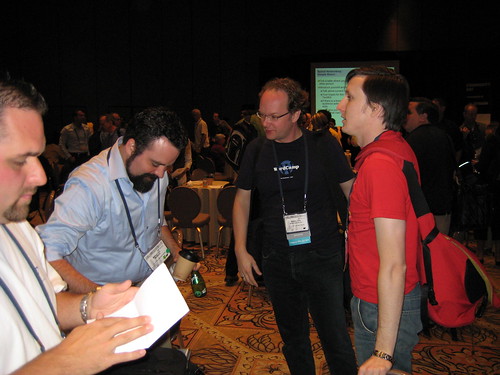James and I have been in Las Vegas this week for SAP TechEd. As mentioned last week, we hosted a RedMonk track during Community Day. We had four sessions ranging from AIR, to Flex building in ABAP, to an Enterprise Irregulars panel on the topic of * 2.0, and rounding up with an session on mapping with deCarta.
I enjoyed each session and the amount of audience interaction at least — or simply packing them in the case of Matthias Zeller’s AIR session — would seem to indicate that the participants liked them.
For me, the most interesting aspect of the sessions was the hunger the audience generally had to get the code. For example, Thomas Jung demo’d a way to build Flex applications in the SAP editor [I’ve forgotten the name], doing away with the need to use FlexBuilder. Audience members kept asking him when SAP would release and where they could get it, and does it come in JSP flavor? The answer was that Thomas had worked on this after hours, that it was his code, and soon to up on Google Code as an open source offering.
The sort of weird thing is that Thomas has to explain what that meant: open source. Namely that it means it’s in no way affiliated with SAP. Maybe it was just me, but there seemed to be a slight clunking in the audience’s collective gear-box.
In other sessions, the same issue played out when there was code to be had: how can we get it?
This is interesting as it’s in contrast to the line we’ve gotten from the higher-level SAP execs: CIOs want stable code that rarely changes. Indeed, this is sort of SAP’s ethos: we build stable platforms/foundations that change little, but allow for some “play”/innovation at higher levels that don’t break anything.
That is, there is hunger at the bottom and satisfied burping at the top.
Surprises and Wiggle Room

James Governor: “I think you’ll be surprised by the success of [ByDesign].”
Peter Zencke: “I like success…but I don’t like to be surprised.”
Open source, of course, isn’t really on the map as a sort of method of core development. Indeed, my sense is that SAP is still at the open source stage where you ask them about it and you get the answer “I’m sick of answering this question, we investing in Zend, etc.”
It seems like there’s very little room made for accidental awesomeness. Now, I don’t know about you, but I’d be hard pressed to find more than a handful of long-term tech innovation that were planned, by design, to be awesome. Typically, the users and developer decide what the purpose of the technology is, not the vendor.
Without that wiggle room, best done through the medium of open source now-a-days, software tends to stagnate and you, the vendor, ends up playing catch-up to other wigglers. On the other hand, this is where large, mega software companies like SAP and IBM have an advantage: they have the cash to catch-up.
Speaking on unexpected uses of technology…
Adobe
One thing is completely cemented in my mind after CommunityDay: Adobe and SAP are going to have a baby soon. I’ve seen plenty of hand-holding over the past few years and SAP-land developers innovating with Adobe products at the edge. But, now I’m pretty convinced that we’ll see Adobe’s RIA stack as one of the new front-ends and ways of “engaging” with SAP-land.
That’s the kind of couple you’d never expect, right? Hip, Macromedia-skin graphed Adobe gettin’ fresh with suit’ed up SAP. The early dancing must have been awkward, but they seem to be working it out.
Disclaimer: SAP, Adobe, and IBM are clients.
Technorati Tags: adobe, communityday, flash, flex, opensource, redmonk, sapteched07


Cote,
I’m a big fan of the SAP Adobe partnership. There is almost zero competitive overlap and the combination is a powerful one. (lots over on my blog on the relationship)
Adobe interactive forms has been key to SAP’s HR stuff for some time, ask any HR presales chap fpr a demo .
Bringing RIA to SAP is goodness. The challenge is to move it from it is possible to widely deployed.